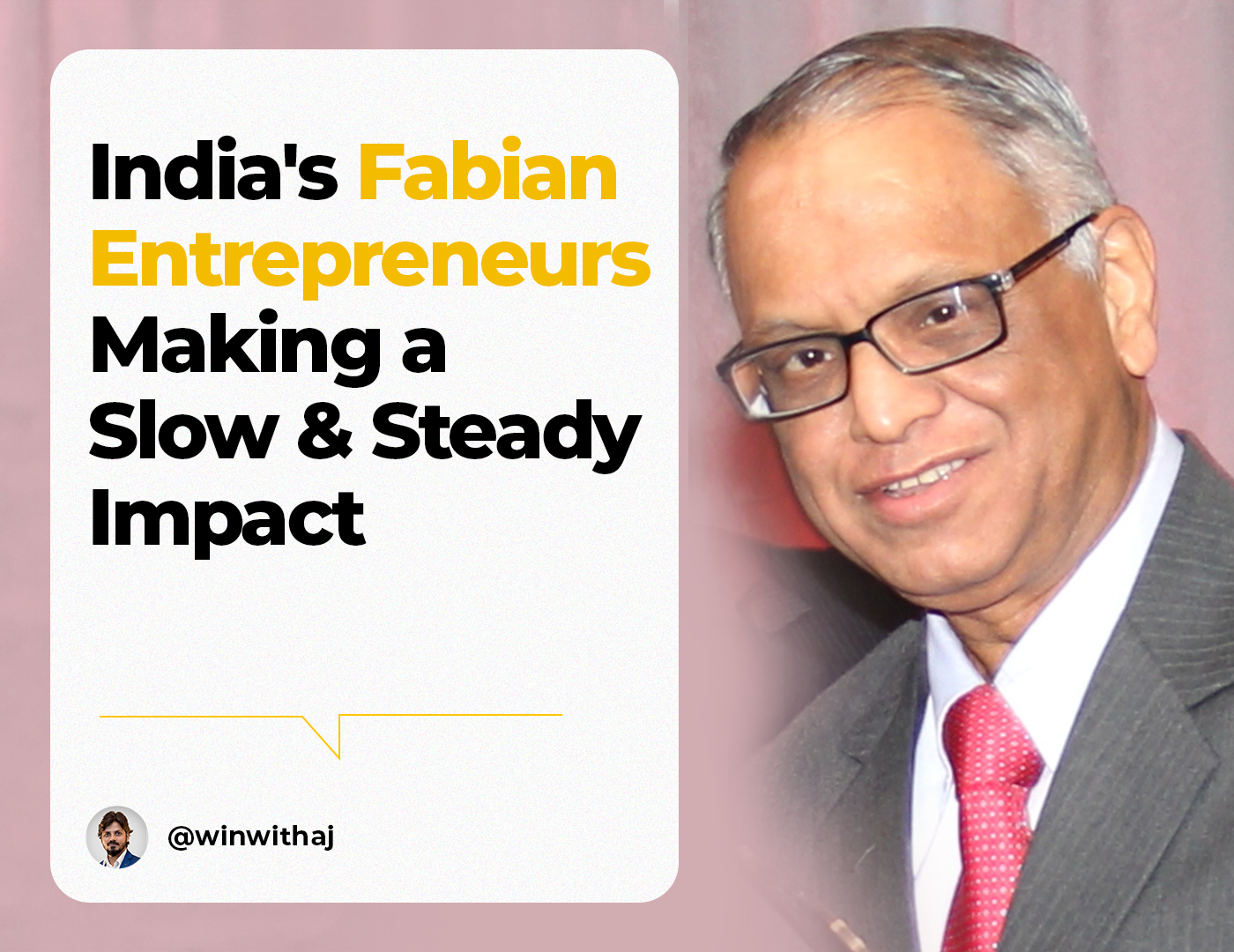
India’s Fabian Entrepreneurs Making a Slow & Steady Impact
In the fast-paced world of business, where rapid growth and quick success often dominate the narrative, there exists a unique breed of entrepreneurs who take a different approach. Fabian entrepreneurs, named after the Fabian Society known for its gradualist approach, believe in slow and steady progress.
These entrepreneurs focus on long-term goals, sustainability, and incremental growth rather than short-term gains.
In India, a country renowned for its diverse entrepreneurial landscape, several Fabian entrepreneurs have made significant contributions to the economy while maintaining their principles.
Introduction to Fabian Entrepreneurship
Fabian entrepreneurship is characterized by a deliberate and cautious approach to business growth. Unlike their counterparts who seek quick wins and rapid expansion, Fabian entrepreneurs prioritize long-term stability, ethical practices, and sustainable development.
The term “Fabian” is derived from the Fabian Society, a British socialist organization that advocated for gradual and reformist, rather than revolutionary, approaches to achieving social change.
Similarly, Fabian entrepreneurs believe in incremental progress, focusing on building solid foundations and enduring businesses.
Leading Fabian Entrepreneurs in India
India’s entrepreneurial landscape is rich with individuals who embody the principles of Fabian entrepreneurship. Here, we highlight some of the leading Fabian entrepreneurs whose journeys and values have made them stand out.
1. Ratan Tata
Ratan Tata, the former chairman of Tata Sons, took over the reins of the Tata Group in 1991. Under his leadership, the conglomerate expanded globally, with significant acquisitions like Tetley, Corus, and Jaguar Land Rover.
Tata’s tenure is marked by his visionary leadership, which transformed the Tata Group into a global powerhouse.
What Makes Him Different
Ratan Tata is known for his cautious and ethical approach to business. He emphasized the importance of corporate social responsibility (CSR) and sustainable development, ensuring that the Tata Group contributed positively to society.
Unlike many entrepreneurs who focus solely on profit, Tata prioritized the well-being of communities and the environment.
Impact and Legacy
Today, the Tata Group is one of India’s largest and most respected business combinations, with a presence in over 100 countries. Ratan Tata’s legacy continues to influence the group’s commitment to ethical practices and long-term growth.
His approach to business serves as a model for future entrepreneurs who aspire to build sustainable and socially responsible enterprises.
2. Azim Premji
Azim Premji, the former chairman of Wipro Limited, transformed the company from a vegetable oil manufacturer into a leading global IT services provider.
He took over the family business in 1966 and led its diversification into the IT sector. Premji’s vision and leadership have been instrumental in Wipro’s growth and success.
What Makes Him Different
Premji’s approach to business is rooted in a deep sense of social responsibility and philanthropy. He established the Azim Premji Foundation, which focuses on improving education in India.
His leadership style emphasizes humility, ethical practices, and sustainable growth. Premji is also known for his commitment to giving back to society, with a significant portion of his wealth dedicated to philanthropic causes.
Impact and Legacy
Wipro is now one of the leading IT services companies globally. Azim Premji’s philanthropic efforts have also made a significant impact, with the Azim Premji Foundation working extensively in the field of education.
His contributions to both business and society have earned him recognition as one of India’s most influential and respected entrepreneurs.
3. N. R. Narayana Murthy
- R. Narayana Murthy is the co-founder of Infosys, one of India’s largest IT services companies. He started Infosys in 1981 with a modest capital and a vision to create a globally respected IT services firm.
Murthy’s leadership and vision have been pivotal in Infosys’ rise to prominence.
What Makes Him Different
Murthy’s leadership is marked by a commitment to ethical practices, transparency, and corporate governance. He championed the cause of employee stock ownership plans (ESOPs) in India, ensuring that employees shared in the company’s success.
Murthy’s focus on values and integrity has set Infosys apart from its competitors.
Impact and Legacy
Infosys has grown into a global IT powerhouse known for its innovation and ethical business practices.
Murthy’s emphasis on values and long-term vision continues to shape the company’s culture. His leadership principles serve as an inspiration for aspiring entrepreneurs who seek to build businesses on a foundation of integrity and ethical conduct.
4. Kiran Mazumdar-Shaw
Kiran Mazumdar-Shaw is the founder of Biocon, a leading biopharmaceutical company in India. She started Biocon in 1978 with a focus on enzyme manufacturing and later diversified into biopharmaceuticals.
Mazumdar-Shaw’s journey is a testament to her resilience and determination in a male-dominated industry.
What Makes Her Different
Mazumdar-Shaw’s approach to business is characterized by her dedication to research and development (R&D) and affordable healthcare.
She has been a strong advocate for innovation and has focused on creating affordable therapies for chronic diseases. Mazumdar-Shaw’s leadership is driven by her passion for making a positive impact on society.
Impact and Legacy
Biocon is now a global biopharmaceutical company known for its innovation and commitment to affordable healthcare. Mazumdar-Shaw’s leadership has positioned Biocon as a leader in the biopharmaceutical industry.
Her efforts to make healthcare accessible and affordable have earned her recognition as one of India’s most influential entrepreneurs.
5. Anand Mahindra
Anand Mahindra is the chairman of Mahindra Group, a diversified business agglomerate with interests in various sectors, including automotive, IT, and finance.
He took over the leadership of Mahindra Group in 1997. Mahindra’s visionary leadership has been instrumental in the group’s expansion and success.
What Makes Him Different
Mahindra’s leadership is marked by a focus on sustainability, innovation, and social responsibility. He has been instrumental in driving the group’s expansion into new sectors while maintaining a commitment to ethical practices and community development.
Mahindra’s approach to business emphasizes the importance of balancing profitability with social and environmental responsibility.
Impact and Legacy
The Mahindra Group is a global business conglomerate with a strong presence in multiple sectors.
Anand Mahindra’s vision and leadership have been key to the group’s sustained growth and diversification. His commitment to sustainability and innovation has set the Mahindra Group apart as a leader in responsible business practices.
The Potential of Fabian Entrepreneurship
Fabian entrepreneurs demonstrate that slow and steady progress can lead to remarkable achievements. Their focus on long-term goals, ethical practices, and sustainable growth sets them apart from their more aggressive counterparts.
By prioritizing stability and incremental progress, Fabian entrepreneurs create businesses that are resilient and capable of weathering challenges.
In India, the contributions of Fabian entrepreneurs like Ratan Tata, Azim Premji, N. R. Narayana Murthy, Kiran Mazumdar-Shaw, and Anand Mahindra highlight the potential of this approach.
Their journeys serve as inspiring examples of how patience, perseverance, and a commitment to values can lead to lasting success.
The Fabian entrepreneurship teaches us that it is possible to achieve significant success without compromising on ethical standards and social responsibility. These entrepreneurs have shown that it is possible to build businesses that not only thrive but also make a positive impact on society.
As more entrepreneurs adopt this approach, we can look forward to a future where business success is measured not just by financial performance but also by positive contributions to society and the environment.
To sum up, Fabian entrepreneurs have carved a niche for themselves in the Indian business landscape by adhering to principles of ethical conduct, long-term vision, and sustainable growth.
Their success stories inspire a new generation of entrepreneurs to follow in their footsteps, proving that slow and steady progress can indeed win the race. By adopting Fabian entrepreneurship, we can build a better, more sustainable future for all.



















